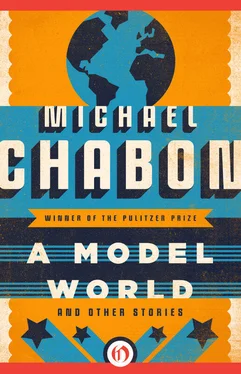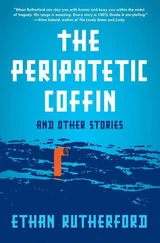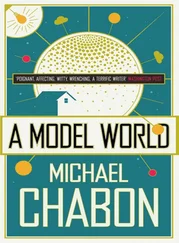Michael Chabon - A Model World And Other Stories
Здесь есть возможность читать онлайн «Michael Chabon - A Model World And Other Stories» — ознакомительный отрывок электронной книги совершенно бесплатно, а после прочтения отрывка купить полную версию. В некоторых случаях можно слушать аудио, скачать через торрент в формате fb2 и присутствует краткое содержание. Год выпуска: 2011, Издательство: Open Road Media, Жанр: Современная проза, на английском языке. Описание произведения, (предисловие) а так же отзывы посетителей доступны на портале библиотеки ЛибКат.
- Название:A Model World And Other Stories
- Автор:
- Издательство:Open Road Media
- Жанр:
- Год:2011
- ISBN:нет данных
- Рейтинг книги:5 / 5. Голосов: 1
-
Избранное:Добавить в избранное
- Отзывы:
-
Ваша оценка:
- 100
- 1
- 2
- 3
- 4
- 5
A Model World And Other Stories: краткое содержание, описание и аннотация
Предлагаем к чтению аннотацию, описание, краткое содержание или предисловие (зависит от того, что написал сам автор книги «A Model World And Other Stories»). Если вы не нашли необходимую информацию о книге — напишите в комментариях, мы постараемся отыскать её.
A Model World And Other Stories — читать онлайн ознакомительный отрывок
Ниже представлен текст книги, разбитый по страницам. Система сохранения места последней прочитанной страницы, позволяет с удобством читать онлайн бесплатно книгу «A Model World And Other Stories», без необходимости каждый раз заново искать на чём Вы остановились. Поставьте закладку, и сможете в любой момент перейти на страницу, на которой закончили чтение.
Интервал:
Закладка:
“Eric Clapton,” said Nathan in an offhand way, watching the back of his father’s head, then, in a burst of fresh alarm, looking to see if Anne was going to call his bluff. She was younger than his father, and he remembered with a start her having told him that the Buffalo Springfield had played at her homecoming in college.
“Eric Clapton?” said his father. “O.K.! That’s amazing, isn’t it, Anne?” She smiled. “Couldn’t have been more than a dozen bars before he got it.”
“That’s great,” said Anne, turning to smile at Nathan. Anne was very nice, Nathan reminded himself, and then felt guilty because he had to remind himself. He’d always liked Anne — had loved her, in fact, when she was just the play lady at his father’s work. He and Ricky had spent entire days down in her playroom, gluing together Popsicle sticks and weaving multicolored pot holders that they brought home to their mother, and Anne would buy them Chinese lunches and comic books. But ever since she was his father’s girlfriend, Nathan had come to suspect all of her former friendliness. He shunned her hugs and sat apart from her.
“It’s David Bowie,” said Ricky. “Ask me, Dad. Ask me.”
“David Bowie,” said Dr. Shapiro. “Get out of here.”
They passed a sign for Annapolis.
“Chuck lives in Annapolis,” said Ricky. “Mom says.”
“Who’s Chuck?” said their father.
Without knowing exactly why, Nathan hit Ricky on the arm, hard — much harder than he had intended to, really — and Ricky began to cry, then stopped and looked at Nathan, his forehead wrinkled and red.
“Um — a doo-doo head,” said Ricky, valiantly turning silly. “Chuck, buck, duck, muck, luck.”
Then the song was over, and Nathan’s heart sank as he realized that the disk jockey in just a moment would identify the singer, and as Ricky arrived, with a gasp, at the end of his incantation. “Fuck,” he whispered behind his hand. He stared blankly at Nathan for an instant, then smiled in horror and delight, his eyes still full of tears. “We’re there,” said Anne, and switched off the radio.
Nathan’s mother had had four boyfriends since the divorce, and, until Chuck, Nathan had liked them all. The first three boyfriends — all of them — wore beards and glasses, like Nathan’s father, and drove calm, square foreign cars. They’d tried very hard to make friends with Nathan, and so he had tried, too; there were ballgames and bats’ jaws and discussions of science. Each time, Nathan felt sad when the boyfriend stopped calling and didn’t come to dinner anymore, though not as sad as his mother. Of the many new spectacles the divorce had created — his mother, in a suit, happily leaving for work in the morning, Nathan fixing their dinner with the radio blaring — the most disturbing was that of their mother crying, which she hadn’t done even at the death of their grandfather but which now they had seen ten times at least.
And now Chuck, a small-plane pilot, was pushing their mother to even greater extremes of emotion. He had an Italian car, with only two seats. On Friday nights when Chuck broke dates, their mother sank into jealous despair, and spent the evening devouring an entire novel or talked on the phone to her friends for hours. She would indulge the boys with popcorn and board games and gin rummy, half-sadly smiling throughout. Very late one evening the past winter, she’d come downstairs in her boots, drawn on her coat, and gone out, returning in tears an hour later. The next morning Nathan found her sitting on the stairs, in her big bathrobe, the rolled Sunday paper lying in her lap. He reached down and took the paper from her and opened it, laughing, as if she were only absent-minded.
“Mom,” he said. “Where did you go last night?”
She told him, crying; the story came out in little bursts as she held her breath between each sob. And over a breakfast at which Nathan drank coffee, and they heard Ricky’s cartoons come on upstairs, as she confided to him other, less desperate tales of checking up on Chuck, he had felt himself, almost physically, growing older.
He felt it even now, with his father. Dr. Shapiro borrowed a dollar’s worth of quarters from Nathan, to feed the parking meter, and Nathan trembled as, for the first time, he made his father a loan. They went into a bookstore, where they ridiculed the romance novels and took turns looking through a history of chess. Dr. Shapiro found a guidebook to the restaurants of Maryland and, having narrowed down the choices to three, allowed Nathan to decide where they would eat lunch. After studying the encapsulated reviews, Nathan settled finally on a waterfront seafood restaurant called the Bonhomme Richard, which specialized in soft-shell crabs, his father’s favorite food. They left the bookstore and headed toward the bay, Anne and Ricky following along behind. The morning clouds had at last begun to scatter, the sun shone; they walked into the lobby of the Bonhomme Richard, and, in the few short moments before they ran into Chuck and some lady, Nathan saw very keenly how soon would come the day when he would be able to walk into a seafood restaurant and anticipate, like a dessert, a pale-brown cocktail. Then he saw Chuck in the lounge, helping a lady with red hair to put on her raincoat.
“It’s like mine,” said Ricky, just before he noticed Chuck. “Hey!”
It was. The lady wore a rubber slicker, the color of a taxicab, with a detachable hood. Chuck held out her empty left sleeve and she smiled at Ricky, as strangers often did. Nathan grabbed his little brother’s arm, as gently as he could bear, and turned him toward their father and Anne, who were already disappearing into the dining room. As the boys followed after, Nathan struggled — like Orpheus and Lot’s wife — against the urge to turn and look back at the handsome, mysterious airplane pilot and the lady in the child’s raincoat. Finally he gave in and was irritated to see that Ricky, too, had turned to look.
“Don’t look,” said Nathan.
“You did,” said Ricky.
They watched Chuck set an extra dollar in the little tray of money, then take the lady’s arm; she looked up brightly into Chuck’s face, and he blew a puff of air, ruffling her red bangs, and then they came at the boys, laughing. They were a happy couple. It was sad. Nathan thought of a time, long ago in Richmond, Virginia, when his parents had stood in the doorway of his bedroom, looking into each other’s faces and at little Nathan dancing naked on his bed, their arms around each other’s waists. Nathan’s father had called his mother Rosie, the only time ever, and Nathan had stopped dancing. “Rosie!” he had cried.
“Here’s Dad,” said Ricky.
Their father approached, his hands outspread, one eyebrow lifted in mock annoyance.
“We’re coming,” said Nathan. “Here we come.”
“What did you see?” said Dr. Shapiro.
They sat down and Nathan opened his menu. At first he was too upset to do anything but stare at the descriptions of all the different dishes. Colored drawings of fish swam around the menu’s border — haddock, cod, flat flounder and sole, and the ugly fish that wasn’t a dolphin but was called a dolphin. He felt — as though suddenly and irrevocably he were his mother’s ambassador to Annapolis and to the whole world — as if he were going to cry.
“Look,” said Ricky. “Admirals.”
They’d been seated in a part of the restaurant that stretched out over the water, at a table beside a window. Across the room, along another row of windows, was the bar, just now entirely taken up by naval officers in white uniforms, nearly two dozen, a flock of admirals. Their upside-down hats littered the top of the bar; the lunchtime sun fell across their square shoulders and lit up their dazzling coats. All the men looked handsome and happy, their cocktails flashed in their hands, and Nathan cherished the elegant lime in a gin-and-tonic.
Читать дальшеИнтервал:
Закладка:
Похожие книги на «A Model World And Other Stories»
Представляем Вашему вниманию похожие книги на «A Model World And Other Stories» списком для выбора. Мы отобрали схожую по названию и смыслу литературу в надежде предоставить читателям больше вариантов отыскать новые, интересные, ещё непрочитанные произведения.
Обсуждение, отзывы о книге «A Model World And Other Stories» и просто собственные мнения читателей. Оставьте ваши комментарии, напишите, что Вы думаете о произведении, его смысле или главных героях. Укажите что конкретно понравилось, а что нет, и почему Вы так считаете.












